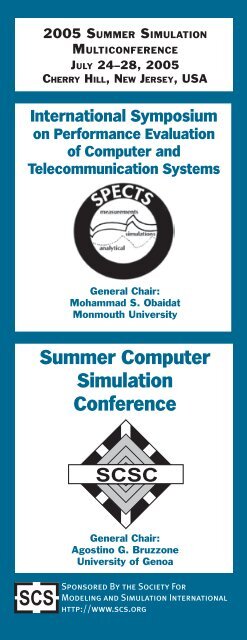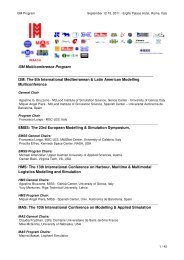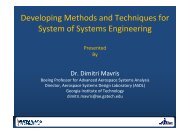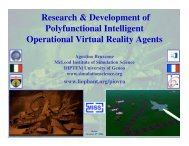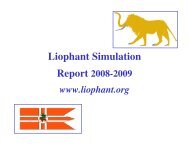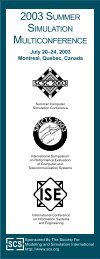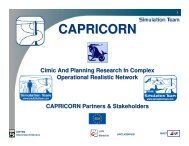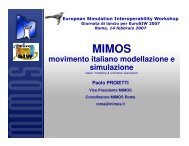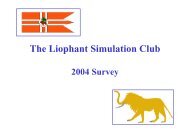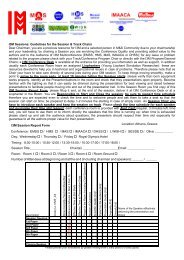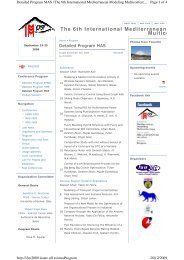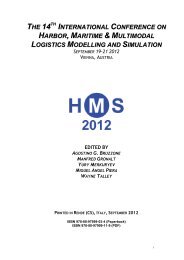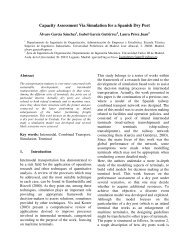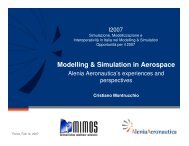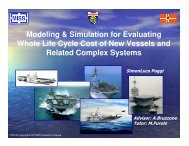Final Program - Liophant Simulation
Final Program - Liophant Simulation
Final Program - Liophant Simulation
Create successful ePaper yourself
Turn your PDF publications into a flip-book with our unique Google optimized e-Paper software.
2005 SUMMER SIMULATIONMULTICONFERENCEJULY 24–28, 2005CHERRY HILL, NEW JERSEY, USAInternational Symposiumon Performance Evaluationof Computer andTelecommunication SystemsGeneral Chair:Mohammad S. ObaidatMonmouth UniversitySummer Computer<strong>Simulation</strong>ConferenceGeneral Chair:Agostino G. BruzzoneUniversity of GenoaSponsored By the Society ForModeling and <strong>Simulation</strong> Internationalhttp://www.scs.org
SummerSim 2005InformationSummerSim ’05 Registration DeskThe registration desk is located in the Crystal foyer and will beopen during the following days and times:Sunday 12:00–5:00 p.m.Monday 7:00 a.m.–5:00 p.m.Tuesday 7:00 a.m.–5:00 p.m.Wednesday 7:00 a.m.–3:30 p.m.SummerSim ’05 Speakers’ BreakfastMon—Wed7:00–8:00 a.m.Room: RiversideSCSC/SPECTS 2005 presenters are invited to enjoy breakfastand the company of co-presenters on the morning of theirpresentations.SummerSim ’05 Exhibit Area HoursMonday Grand Ballroom C 10:00 a.m.–7:30 p.m.Tuesday Grand Ballroom C 10:00 a.m.–7:30 p.m.Wednesday Grand Ballroom C 10:00 a.m.–12:00 p.m.Coffee breaks are held daily at 10:00 a.m. and 3:00 p.m.in the Exhibit Area.SummerSim ’05 Exhibitor ReceptionMonday6:00–7:30 p.m.Room: Grand Ballroom CSummerSim ’05 General Sessionand Keynote AddressMonday—Wednesday 8:30–10:00 a.m.Room: Grand Ballroom A/BMondayBernard Zeigler, University of Arizona, USATuesdayProf. Shivendra Singh Panwar, Polytechnic University, USAWednesdaySumit Ghosh, Stevens Institute of Technology, USASummerSim ’05 2005 Luncheon and AddressWednesday12:00–1:30 p.m.Room: RiversideNabil R. Adam, Director, The Center for Information Management,Integration and Con nectivity (CIMIC) Rutgers, The State Universityof New Jersey, USA2 Summer <strong>Simulation</strong> Multiconference
SummerSim 2005MeetingsSCS Executive Committee MeetingSaturday, July 23 12:00–6:00 p.m.Room: Plaza IFrancois Cellier, SCS PresidentThe Executive Committee conducts administrative reviews of the affairs of theSociety. All members of the Executive committee are expected to attend. Membersof the Board of Directors are welcome to observe.SCS Executive Committee MeetingSunday, July 24 8:00 a.m.–3:00 p.m.Room: Plaza VIFrancois Cellier, SCS PresidentThe Executive Committee conducts administrative reviews of the affairs of theSociety. All members of the Executive committee are expected to attend. Membersof the Board of Directors are welcome to observe.MISS Annual MeetingSunday, July 24 9:00 a.m.–12:00 p.m.Room: Plaza VIIAgostino Bruzzone, Coordinating DirectorDirectors and representatives of centers of the McLeod Institute of <strong>Simulation</strong>Sciences review and plan activities of the Institute.M&SNet Annual MeetingSunday, July 24 1:00–5:00 p.m.Room: Plaza VIITuncer Ören, Coordinating DirectorOn behalf of the organizers of the workshop we hereby announce thesecond official meeting of the new M&SNet will take place at the 2005Summer <strong>Simulation</strong> Mutliconference, on Sunday, July 24.The McLeodModeling and <strong>Simulation</strong> Network (M&SNet) is a consortium of co-operatingindependent organizations active in professionalism, research, education,and knowledge dissemination in the modeling and simulation (M&S) domain.It was established in 2003 by the Society for Modeling and <strong>Simulation</strong>International (SCS). The M&SNet aims to provide an organizational structurethat will serve to integrate and enrich, within its organizations, modelingand simulation activities throughout the world. The M&SNet provides aframework within which organizations interested in M&S can interact, shareexpertise, and work on problems of common interest.SPECTS 2005 Pre-conference BriefingSunday, July 24 4:00–5:00 p.m.Room: Crystal IMohammad Obaidat, SPECTS General ChairAll with an organizing role in this year’s Symposium on Performance Evaluationof Computer and Telecommunication Systems meet to coordinate the week’sactivities.SCSC 2005 Pre-conference BriefingSunday, July 24 4:00–5:00 p.m.Room: Crystal IAgostino Bruzzone, SCSC General ChairAll with an organizing role in this year’s Summer Computer <strong>Simulation</strong> Conferencemeet to coordinate the week’s activities.July 24–28, 20053
SPECTS 2005SPECTS Tutorials: Sunday, July 24, 2005All tutorials are half-day tutorials, scheduled for 3 hours plus 30minutes coffee break in the middle. Please see registration deskfor availability.MORNING SESSIONSunday 9:00 a.m.–12:30 p.m.Tutorial #1 (Room: Plaza IV)Using the Innovative NCTUns 2.0 Network Simulatorand Emulator to FacilitateNetwork ResearchesShie-Yuan Wang, National Chiao Tung University, TaiwanThe purpose of doing this tutorial is to introduce a new and useful network simulator/emulator (the NCTUns2.0, http://NSL.csie.nctu.edu.tw/nctuns.html) to the networking research community. Using a novel simulationmethodology, the NCTUns 2.0 provides several unique advantages that cannot be easily achieved by traditionalnetwork simulators such as ns-2 and OPNET Modeler.Tutorial #2 (Room: Plaza V)Sensor Networks – Applications, Technologies andProtocolsAnura P. Jayasumana, Colorado State University, Fort Collins, CO,USA.This tutorial will review the emerging world of sensor networks, and look at the fundamental issues indesigning and analyzing sensor networks. Emerging and potential applications will be considered togetherwith the associated sensors. Localization and tracking will be used as examples to expose the scalabilityconstraints in these sensor networks. Emerging technology and standards will be covered, including sensorhardware, networking, OS support, algorithms, and scalability. Also covered will be querying, routing, andnetwork self-organization.AFTERNOON SESSIONSunday 1:30–5:00 p.m.Tutorial #3 (Room: Plaza IV)Web Caching, its Application and Performance AspectsRachid El Abdouni Khayari, University of Armed Forces Munich,GermanyToday, the largest share of traffic in the Internet originates from WWW requests. The increasing use ofWWW-based services has not only led to high frequented web servers but also to heavily-used componentsof the Internet. Fortunately, it is well known that there are popular and frequently requested sites, so thatobject caching can be employed to reduce Internet network traffic and to decrease the perceived end-to-enddelays. Caching has been recognized as one of the most important techniques to reduce Internet bandwidthconsumption caused by the tremendous growth of the WWW. The tutorial purpose is also to give an aid inunderstanding the latest developments in web caching.Tutorial #4 (Room: Plaza V)Integration toward Future Heterogeneous WirelessNetworksDharma Agrawal, University of Cincinnati, USADave Cavalcanti, Philips Research, USAThis tutorial provides an overview of different wireless networking technologies and discusses the mainresearch challenges in supporting integration of Heterogeneous Wireless Networks (HWN) to build a totallypervasive computing environment where the users can have “always the best connectivity” and accessinformation anytime, everywhere and with any device. Such integrated environments have been usuallyreferred as Beyond 3G (B3G) or 4G systems. The tutorial addresses the state of the art research topics relatedto the integration architectures for cellular systems, WLANs and MANETs; radio spectrum utilization; mobilityand connection management; and QoS support across heterogeneous networks. Integration of HWNs isan important research topic, since interoperability between different technologies is a must for successfulevolution of communication systems.4 Summer <strong>Simulation</strong> Multiconference
SPECTS 2005SCSC TutorialsMORNING SESSIONSunday 9:00 a.m.–12:30 p.m.Tutorial #1 (Room: Plaza I)Deterministic Analysis of Discrete Stochastic Models:Proxel-Based <strong>Simulation</strong>Sanja Lazarova-Molnar, University of Magdeburg, GermanyThe proxel-based method was recently developed for simulation of discrete stochastic models. The methodapproaches the problem in a very intuitive manner and it works by exploring all of the possible behavioursof the model. The proxel simulation can be also interpreted as solving a specific Markov chain, creatingthe probabilities for the state changes on-the-fly. We believe that besides the fact that the method can becompetitive for certain classes of models, that it is especially useful for the purpose of learning how discretestochastic models behave and the way the probability flows.Tutorial #3 (Room: Plaza II)Design of Experiments for <strong>Simulation</strong> ProjectsEdward Williams,PMCorp, USAEnrico Bocca, <strong>Liophant</strong> <strong>Simulation</strong>, ItalyThis tutorial is devoted to using DOE (Design of Experiments) in <strong>Simulation</strong> projects for completing experimentalanalysis of results; the course include ANOVA analysis applied to Stochastic Discrete Event <strong>Simulation</strong> aswell as Factorial and Composite Designed for Sensitivity Analysis and Meta-modeling. Critical Issues on DOEapplied to simulation are highlighted and a detailed overview of techniques and real examples is provided tothe attendees. The different approaches provided by the experts of DOE are proposed as well as considerationsto be used with Industrial Simulators (i.e. Discrete Variables, Optimization Critical Issues and PerformanceLimits). The attendees are expected to have some basic background in statistics.Tutorials #5 (Room: Plaza III)Ethics in <strong>Simulation</strong> (SimEthics)Tuncer Ören, MISS - Ottawa Center, CanadaThe importance and the scope of application areas of modelling and simulation are growing. This obliges us,i.e., simulation professionals, to re-examine our field and reflect upon whether or not those who are involvedin any aspect of it have any responsibility. Professional ethics consists of the rules or standards governing theconduct of a person or the members of a profession. SCS (Society for Modeling and <strong>Simulation</strong> International)has adopted, effective January 1, 2004, a Code of Professional Ethics for <strong>Simulation</strong>ists. The code is alreadyadopted by other organizations affecting 100s of individuals and this number is increasing.AFTERNOON SESSIONSunday 1:30–5:00 p.m.Tutorial #2 (Room: Plaza I)Web Based Multi-Paradigm <strong>Simulation</strong>Bipin Chadha, Coensys, Inc., USAThis half day tutorial will provide a quick overview of discrete event, system dynamics, and agent based simulationtechniques. The tutorial compares the three simulation paradigms and their relative strengths and weaknesses.We then provide an overview of emerging requirements of complex systems and architectures and the needfor multi-paradigm simulations. The tutorial then provides an overview of multi-paradigm / hybrid modelingand simulation for complex systems. The tutorial then goes into development of an example multi-paradigmsimulation, using AnyLogic, illustrating the concepts from different paradigms and benefits of using a hybridapproach. The tutorial ends by demonstrating how a web-based simulation is created from the hybrid model.Tutorial #4(Room: Plaza II)<strong>Simulation</strong> for Time Series Analysis andForecastsRoberto Mosca, DIPTEM, ItalyEnrico Briano, <strong>Liophant</strong> <strong>Simulation</strong>, ItalyThis Tutorial focuses an providing an overview about benefits of using the <strong>Simulation</strong> for Time Series Analysisand forecasts.The tutorial include an overview about the methodologies to model these phenomena and foranalyzing data; the tutorial includes applicative introduction to both Time Series Analysis, Moving Averageand Exponential Smoothing, ARMA and ARIMA; the tutorial proceeds in presenting simulation as support forestimating effectiveness of different techniques in forecasting considering stochastic nature of processesto be investigated, cluster analysis and constraints influence.Indeed the tutorial discusses fundamentalsabout the common use forecast models and time series analysis in different applications: demand analysis,logistics, planning, etc.July 24–28, 20055
SummerSim 2005Meetings (continued)SCS Membership BoardMonday, July 25 10:30 a.m.–12:00 p.m.Plaza VIMohammad Obaidat , SCS Vice President of MembershipMembership associate vice presidents meet with the vice president of membershipto discuss activities and plans for membership services, especially includingdevelopment of Technical Councils and Chapters. All current and prospectivemembers are encouraged to attend and participate.SCSC 2006 PlanningTuesday, July 26 12:00–1:30 p.m.Plaza IAgostino Bruzzone, SCSC General ChairSummer Computer <strong>Simulation</strong> Conference organizers critique this year’s program,plan for next year, and suggest future sites for conference board consideration. Allinterested in participating in an organizing role are welcome.SPECTS 2006 PlanningTuesday, July 26 12:00–1:30 p.m.Plaza IIMohammad Obiadat, SPECTS General ChairAll interested in an organizing role for next year’s Symposium on PerformanceEvaluation of Computer and Telecommunication Systems should attend.SCS Publications BoardMonday, July 25 1:30–3:00 p.m.Plaza VISCS Vice President of PublicationsEditors of Society publications meet with the vice president of publications andproduction staff to deal with publications issues.M&S Workforce Development ITuesday10:30–12:00 p.m.Plaza VIIChair: Bill Waite, Aegis Technologies Group, USASCS Bylaws, Policies, and ProceduresTuesday, July 26 10:30 a.m.–12:00 p.m.Plaza VISCS Senior VPThis committee considers proposed changes to SCS Bylaws and maintains ourPolicies and Procedures. Members willing to assist are welcome.SCS European OperationsTuesday, July 26 1:30–3:00 p.m.Plaza VIFrancois Cellier, SCS PresidentLeading European members meet with officers of the Society to discussadministration of SCS activities in Europe.6 Summer <strong>Simulation</strong> Multiconference
SummerSim 2005Meetings (continued)SCS Board of Directors Budget CaucusTuesday, July 26 3:30–5:00 p.m. Plaza VIS. Narayanan, SCS TreasurerMembers of the board of directors review the finances of the Society, especially theproposed budget, in preparation for the board meeting on Thursday.Nominating CommitteeWednesday, July 27 10:30 a.m.–12:00 p.m.Plaza VIBernard Zeigler, SCS Immediate Past PresidentExecutive committee and council-appointed members of the nominating committeeestablish credentials for seating members of the board of directors and proceedwith selection of candidates for next year’s election.SCS Conference BoardWednesday, July 27 1:30–3:00 p.m.Plaza VIJoe Gauthier, SCS Vice President of ConferencesRepresentatives of each international conference, the vice president, and office staffdiscuss issues, review recent conferences, and select future sites and topics.SCS Senior Vice President’s BoardWednesday, July 27 3:30–5:00 p.m.Plaza VIFrançois Cellier, SCS Senior Vice PresidentThis meeting includes reports and discussions of strategic planning, bylaws,changes to policies and procedures, simulation standards, and affiliations withother societies.Board of Directors Operation Caucus (evening)Wednesday, July 27 5:00–7:00 p.m.Plaza VIS. Narayanan, SCS TreasurerA meeting of the SCS Executive Committee and Board of Directors representativesto review the operational plans of SCS in preperation for approval of the 2005-06annual budget. All interested BOD representatives are invited to attendBoard of Directors Annual MeetingThursday, July 29 8:00–5:00 p.m.Grand Ballroom AFrancois Cellier, SCS PresidentThe board meets to hear reports, review operations of the Society, and steer thecourse of the Society for the next fiscal year and beyond. All members of the SCSboard and officers of the Society are expected to attend and participate. All SCSmembers are welcome to observe.July 24–28, 20057
SummerSim 2005Steering Committee Chair’s MessageMohammad S. ObaidatSteering Committee ChairSummerSim 2005Welcome to the 2005 Summer <strong>Simulation</strong>Multiconference (SummerSim’05). This year’sconference marks the 37th anniversary of theSummerSim. The first conference, named“Conference on Applications of ContinuousSystem Languages,” was held in the summer of1969. In 2002 we renamed the conference theSummer <strong>Simulation</strong> Multiconference to reflectits multiconference nature and our restructuringefforts. SummerSim’05 includes two well-knownconferences: the 2005 International Symposiumon Performance Evaluation of Computer andTelecommunication Systems (SPECTS’05)and the 2005 Summer Computer <strong>Simulation</strong>Conference (SCSC’05). This year’s SPECTSalso includes the very successful workshop we initiated last year, the 2005Workshop on Performance of Wireless Networks and Communication Systems(WiNCS’05).Since July 2002, SCS conferences have undergone major restructuringin order to best serve the profession, participants, and society members. Wehave two major goals from this restructuring: short-term and long-terms goals.Initial results from the restructuring are very promising and encouraging.This multiconference provides a unique opportunity for an author tosubmit papers to two different conferences that convene in the same placeand during the same period. In addition to offering a stimulating environment,our multiconference saves a lot of expenses for the participants, presenters,exhibitors, and the organizers.SummerSim’05 offers a unique forum for researchers and practitioners fromacademia, industry, business, and government to share their expert results andresearch findings in all areas of modeling and simulation, and performanceevaluation of computer, telecommunications, andwireless systems.This year’s multiconference includes a superb technical program, fouroutstanding distinguished keynote speakers, insightful tutorials, and anexhibit. We have chosen the Hilton Philadelphia/Cherry Hill Hotel as the sitefor our conference. The hotel provides excellent meeting facilities and will be acomfortable setting for our multiconference. The conference site is very closeto the city of Philadelphia, with its historical attractions and proximity to manyexciting spots in New Jersey and New York City.Organizing an international conference of this caliber requires the dedicationand hard work of many individuals. My sincere appreciation goes to all authors,including those whose papers were not included in the program. Many thanksgo to the technical program committee members and their reviewers, sessionchairs, and the dedicated efforts of the SummerSim executive and steeringcommittees. Special thanks go to Professor Agostino Bruzzone, general chairof SCSC’05 and Professor Franco Davoli, vice general chair of SPECTS’05.Many thanks to Professors Mario Marchese and Jose Marzo, program chairs ofSPECTS’05; Professor Edward Williams, program chair of SCSC’05; and Ms.Marina Massei for their superb work. Many thanks go to Professors VojislavMisic and Jelena Misic for their outstanding work on WiNCS’05 Workshop.Thanks to Professor Abbas Jamalpour for putting together an excellent tutorialprogram. Special thanks go to Mike Chinni, SummerSim’05 webmaster, forhis outstanding work and timely response. Many thanks to vice chairs, tutorialchairs, track chairs, special sessions’ organizers, exhibit chair, and publicitycommittee. Thanks are also due to the staff of the Society for Modeling and<strong>Simulation</strong> International (SCS) for their fine support.<strong>Final</strong>ly, on behalf of the executive and steering committees of SummerSim’05and SCS I invite all of you to enjoy the program and your stay in Philadelphia/Cherry Hill.Mohammad S. Obaidat, Steering Committee Chair, SummerSim’058 Summer <strong>Simulation</strong> Multiconference
SPECTS 2005SPECTS 2005 General Chair’s Message“Performance evaluation is crucial for properdesign, operation, and planning”Welcome to the 2005 International Symposiumon Performance Evaluation of Computer andTelecommunication Systems, SPECTS’05. Thisyear’s conference marks the 8th anniversary ofSPECTS, which is progressing at an impressiverate both in terms of quality and quantity.SPECTS’05 offers a unique forum forresearchers and practitioners from academia,industry, business, and government to sharetheir expert results and research findingsMohammad S. ObaidatSteering Committee Chair, in all areas of performance evaluation ofSummerSim 2005computer, telecommunications, and wirelesssystems including modeling, simulation, andmeasurement/testing of such systems.This year’s SPECTS includes an outstanding technical program, fourdistinguished keynote speakers, insightful tutorials, and an exhibit. We havechosen the Hilton Philadelphia/Cherry Hill Hotel as the site for our conference.The hotel provides excellent meeting facilities and will be a comfortable settingfor our multiconference. Its proximity to the city of Philadelphia gives a goldenopportunity for locals to participate in the conference without much hassle.It also gives participants from outside the area and their companions theopportunity to enjoy the many attractions and historical sites in Philadelphia andthe surrounding areas. The conference site is also close to many museums,shopping areas, and historical sites in New Jersey and New York City. Thetheme of this year’s conference, “Performance evaluation is crucial for properdesign, operation, and planning,” reflects the vital role this technology isplaying in the new economy and information society, where computer andtelecommunication systems, both wired and wireless, are widely used andspread all over sectors, countries, and continents.This years’s technical program consists of several parallel tracks everyday for three days. Each track consists of several sessions of top-qualitypapers. The topics covered in the program include wireless communicationand networks, security and reliability, high speed networks, mobile and ad hocnetworks, wireless LAN s, Quality of Service (QoS), Internet computing, webserver performance, high performance computing/computers, switching androuting, parallel and distributed systems, computer architecture, queuing, TCP/IP performance and analysis, fault-tolerant systems, parallel and distributedsimulation, flow and congestion control, client–server systems, load balancing,multimedia, resource management, tuning, measurement, and Internet webbasedapplications and services, among others. This year we received a largenumber of high-quality papers. We accepted only very high-quality papers.Many individuals have contributed to the success of this high- caliberinternational conference. My sincere appreciation goes to all authors includingthose whose papers were not accepted in the program. Special thanks toProfessor Franco Davoli, vice general chair, for his exceptional continuoussupport over the years. Many thanks to program chairs of SPECTS’05Professors Mario Marchese and Jose Marzo, as well as to the WiNCS 2005program chairs, Professors Vojislav Misic and Jelena Misic, for their outstandingwork on the technical program. Thanks to Professor Abbas Jamalpour, tutorialchair of SPECTS’05, for putting together the excellent tutorial program. Specialthanks goes to the Webmaster Mr. Mike Chinni, for his outstanding work andtimely response. Special thanks to Dr. Guoping Zeng, publicity chair, for hisgreat efforts at publicizing the conference. Thanks also to other members ofthe publicity committee, especially Prof. Martin Kappes, Dr. Weiguang Shi,and Prof. Antonio Pescapè. Many thanks to vice chairs, tutorial chairs, trackchairs, special sessions’ organizers, and the exhibit chair. Thanks also are dueto the staff of the Society for Modeling and <strong>Simulation</strong> International (SCS) fortheir fine support.<strong>Final</strong>ly, on behalf of the executive and steering committees of the 2005International Symposium on Performance Evaluation of Computer andTelecommunications Systems, and the Society for Modeling and <strong>Simulation</strong>International, I invite all of you to join us in July at SPECTS’05.Mohammad S. Obaidat, SPECTS’05 General ChairJuly 24–28, 20059
SCSC 2005SCSC 2005 General Chair’s MessageAgostino BruzzoneGeneral Chair, SCSC 2005MISS, DIP,University of Genoa, ItalyWelcome to the 2005 Summer Computer <strong>Simulation</strong>Conference. This event has a long-standing tradition inthe Modeling & <strong>Simulation</strong> community as it is probablyone of the earliest forums for scientists, researchersand professionals in the Sixties. Today, the SummerComputer <strong>Simulation</strong> Conference is continuing itsrole as a leading reference for promoting innovationin <strong>Simulation</strong> Technologies.Recently, “<strong>Simulation</strong>” has become a very popularsubject due to the impact of the latest changes ininfrastructures and technologies. Today, in fact, dataand communication infrastructures allow simulationto be used in new sectors, making on-line, realtimesupport available for running and experiencingscenarios in a direct link with the ongoing reality. At thesame time, simulation techniques and methodologies have evolved to become extremelyreliable and effective also with limited investments in terms of time, resources and money,thus extending their use into new application areas.While the simulation world benefits from such aspects, the demand for this technologyis growing owing to today’s complex and dynamic environment based on a rapidly evolvingglobal market. Within such a framework the need to reorganize planning and organizationsand to identify new and rapid solutions to very difficult problems provides new challengesto simulation.Therefore, this year’s Summer Computer <strong>Simulation</strong> Conference once again providesinnovative contributions in different areas, while presenting examples in which M&S(Modeling and <strong>Simulation</strong>) was successfully implemented, completing validation andverification of up-to-date technologies in this field.In 2005, the Summer Computer <strong>Simulation</strong> Conference is being held again onthe East Coast, a very active area for M&S research and a very important region thatprovides challenges with regard to transportation, market analysis, environment, logistics,security, etc.This year’s Summer Computer <strong>Simulation</strong> Conference also includes several tracksto cover various aspects. Special attention has been focused on guaranteeing the qualityof the contributions. To ensure such quality, the paper must undergo an extensive reviewprocess not only dedicated to selecting the manuscripts but also to providing commentsand instructions to the authors about improving their contribution. It is based on such anapproach that the International <strong>Program</strong> Committee (IPC) guaranteed the Conference’shigh profile and made it possible to select the best papers to be awarded and published ina special issue of the “International Journal of <strong>Simulation</strong> Modelling”, scheduled for early2006. As usual, special sessions of the conference are devoted to organizing TechnicalCouncil Meetings (i.e. <strong>Simulation</strong> Applications in Management, Planning and Forecasting)and tutorials, while top quality networks can benefit from the Summer Computer <strong>Simulation</strong>Conference as an opportunity to promote their activities, such as the McLeod Institute of<strong>Simulation</strong> Science, MS_Net, <strong>Liophant</strong> <strong>Simulation</strong> and SimSummit.In addition, as the General Chair, I’m very proud of the SCSC2005 Student Workshoptradition that was established in 2003: this year as well students will be able to attend thisworkshop and to submit their contributions that are subject to the same rigorous reviewprocess established for regular papers. These contributions are included in the ConferenceProceedings CD and guarantee full access to the event with a very special registrationfee ($55 USD plus Student ID and Professor Check), while the best student papers willbe awarded, as in the past, with a money check as recognition of their efforts.Because these impressive results were made possible thanks to many individualcontributions, I would like to extend my most sincere gratitude to all authors, technicalprogram committee members and their reviewers, as well as track and sessions chairsand organizers. Special thanks as well to the Steering Committee Chair Mohammad S.Obaidat, to the <strong>Program</strong> Chair Edward Williams, to Track Chairs and to the IPC: T. Altiok,V. Amico, I. Barjis, F. Barros, G. Benvenuto, L. Birta, M. Brandolini, C. Briano, P. Broas, J.Couretas, G. Cunha, C.L.N. dos Santos, P. Elfrey, A. Elkamel, C. Frydman, N. Giambiasi,P. Gravitz, A. Guasch, A. Haghani, J.A. Hamilton, R. Hill, V. Hlupic, R. Huntsinger, M. Itmi,A. Javor, P. Kropf, R. Lutz, M. Massei, R. McGraw, M. Mollaghasemi, R. Mosca, T. Ören,M.A. Piera, H. Pranevicius, H. Qiao, E. Radwan, C. Roberts, L. Rothrock, H. Sarjoughian,S. Saetta, B. Schroer, S. Simeoni, R. Signorile, R. Strini, S. Swenson, H. Szczerbicka,H. Unger, J. Uzdzinski, G. Wainer, J. Wallace, F. Wieland, L. Yilmaz, S. Youngblood, M.Zarrillo and A. Zini.I’m also pleased to acknowledge the efforts of M. Chinni for the SCSC2005 Webwork and the SCS International Office for their valuable contributions, and namely: SteveBranch, Amy Shapiro and Mark Yen.So I look forward to seeing you at the Summer Computer <strong>Simulation</strong> Conferencewithin the wonderful setting of Philadelphia.Agostino G. Bruzzone, SCSC2005 General Chair10 Summer <strong>Simulation</strong> Multiconference
SPECTS 2005SummerSim Keynote SpeakersMonday8:30–10:30 a.m.Grand Ballroom A/BKeynote Address #1“How DEVS Theory Impacts M&SPractice in a Net-Centric World”Presented by Bernard Zeigler, Universityof Arizona, USATuesday8:30–10:30 a.m.Grand Ballroom A/BKeynote Address #2Some Unsolved Problems in HighSpeed Packet SwitchingPresented by Prof. Shivendra Singh Panwar,Polytechnic University, NYC, USAWednesday8:30–10:30 a.m.Grand Ballroom A/BKeynote Address #3Modeling and <strong>Simulation</strong> in anUnprecedented Role inBusiness: Enabling a NewTechnical Stock Market IndexPresented by Sumit Ghosh, StevensInstitute of Technology, USAWednesday12:00–1:30 p.m.Riverside PavilionKeynote Address #4Incident Management System:Some Research ChallengesPresented by: Nabil R. Adam, Director,The Center for Information Management,Integration and Con nectivity (CIMIC)Rutgers, The State University of NewJersey, USAJuly 24–28, 200511
SPECTS 2005International Symposium onPerformance Evaluation of Computerand Telecommunications Systems<strong>Simulation</strong> Conference 2005General ChairMohammad S. ObaidatMonmouth UniversityVice General ChairFranco DavoliDIST-University of Genoa<strong>Program</strong> ChairsMario MarcheseCNIT - Italian National Consortium forTelecommunicationsUniversity of Genoa Research Unit, ItalyJose L MarzoUniversity of Girona, SpainVice <strong>Program</strong> & Special Sessions ChairImad MahgoubFlorida Atlantic University, USATutorials ChairAbbas JamalipourUniversity of Sydney, AustraliaVice <strong>Program</strong> ChairPascal LorenzUniversity of Haute Alsace, FranceTechnical program co-sponsored by IEEESystems, Man, and Cybernetics (SMC) SocietyMonday July 25Monday 8:30–8:40 a.m.Opening SessionMonday 8:40–10:00 a.m.Keynote Speaker 1: All Tracks12 Summer <strong>Simulation</strong> Multiconference
SPECTS 2005TRACK 1Session 1: Satellite Communications IMonday 10:30 a.m.–12:00 p.m.Room: Crystal IChair: Anca Vermesan, Nera Broadband SatelliteAS - Research and Development, NorwayScalable QoS Management in Next GenerationGEO-Satellite NetworksSalvatore Marano, Floriano De Rango, Valeria Loscrí, PeppinoFazio, Mauro TropeaUniversity of Calabria, Rende, Cosenza, ItalyAnt Routing Algorithms For Irregular SatelliteConstellationsLaura Rosati, Matteo BerioliGerman Aerospace Center (DLR), GermanyGianluca Reali, University of Perugia, ItalyAdaptive Rate Control For QoS Mapping At SatelliteIndependent Service Access PointsMario Marchese, Maurizio Mongelli, University of Genoa, ItalySession 2: Satellite Communications IIMonday 1:30–3:00 p.m.Room: Crystal IChair: Krishna Kant, Intel Corporation, USAThe Implementation of Erasure Coding Schemes inCCSDS File Delivery Protocol for Reliable Communicationsin Hazardous Satellite EnvironmentsTomaso De Cola, Mario Marchese, University of Genoa, ItalyHarald Ernst, German Aerospace Center (DLR), GermanyThe Study on Providing Hierarchical SatelliteBroadcasting Scheme using DVB-S2 TransmissionStructureMin-Su Shin, Dae-Ig Chang, Deock-Gil Chang, Ho-Jin LeeElectronics and Telecommunications Research Institute, KoreaIntroducing P2EP: the Fusion between Peer-to-Peer Architectures and Performance EnhancingProxiesLuca Caviglione, Franco Davoli, University of Genoa, ItalyPerformance and Design Considerations for EfficientIntegration of VoIP into DVB-RCS BroadbandSatellite NetworksAnca Vermesan, Nera Broadband Satellite AS - Research andDevelopment, NorwayJuly 24–28, 200513
SPECTS 2005Session 3: Transport LayerMonday 3:30–5:00 p.m.Room: Crystal IChair: Helen Karatza, AristotleUniversity of Thessaloniki, GreeceIssues in Performance Evaluation of New TCPStacks in High Speed NetworksFrancesco Vacirca, University of Rome, La Sapienza, ItalySaverio Mascolo, Politecnico di Bari, ItalyTCP Performance Evaluation: Methodologies andApplicationsCarlo Caini, Rosario Firrincieli, Daniele LacameraUniversity of Bologna, ItalySCTP Performance in Data CenterEnvironmentsNrupal Jani, Krishna Kant, Intel Corporation, USAAnalytical Approximations of the TCPThroughput and Packet Loss Probability in Multi-Service Communication NetworksIgor Bisio, Mario Marchese, University of Genoa, ItalyTRACK 2Session 1: Resource Management IMonday 10:30 a.m.–12:00 p.m.Room: Crystal IIChair: Carlos Belo, Instituto SuperiorTecnico, Lisbon, PortugalCoexistence of Deterministic and ProbabilisticQoS Guarantees for Real-Time TrafficsPascale Minet, INRIA, FranceLeila Saidane Azouz, ENSI – CRISTAL, Tunis, TunisiaSteven Martin, University of Paris, FranceA Proposal of Efficient Multicast DistributionScheme Using Erasure Codes and itsEvaluationJun Takahashi, Hideki Tode, Koso MuratamiOsaka University, JapanCoupled-Layer Type Waveband Path Design ConsideringDynamic Traffic ChangesHideki Tode, Shinji Takayama, Koso MurakamiOsaka University, Japan14 Summer <strong>Simulation</strong> Multiconference
SPECTS 2005A Dynamic Round-Robin Architecture for a Call-Based Load Balancer, an Analytical and SimulativeStudySergio Montagna, Riccardo Gemelli, Italtel SpA, ItalySession 2: ResourceManagement IIMonday 1:30–3:00 p.m.Room: Crystal IIChair: Rachid El Abdouni KhayariUniversity of the Armed Forces, Munich, GermanyScaling Analysis on Delay PropagationPropertiesTakuo Nakashima, Kyushu Tokai University, JapanPerformance Enhancement by Segregation andHybrid Integration in General QueueingNetworksMostafa Dahshan, Pramode Verma, University of Oklahoma, USADynamic Resource Reservation and QoSManagement in IEEE 802.11e NetworksJürgen Wolf, Stephan Heckmüller, Bernd WolfingerUniversity of Hamburg, GermanySession 3: Resource Management IIIMonday 3:30–5:00 p.m.Room: Crystal IIChair: Hideki Tode, Osaka University, JapanControl Theoretic Adaptive Admission Control inWCDMA NetworksPriyan De Alwis, Harsha Sirisena, Krzysztof PawlikowskiUniversity of Canterbury, New ZealandOn the Finite Queueing System M/M/L/m/cYi Su, Masergy Communications, Inc, USAGuoping Zeng, Imrich ChlamtacThe University of Texas at Dallas, USAAnalysis and Implementation of a Stateless CongestionControl AlgorithmAntonio Almeida, Carlos BeloInstituto Superior Tecnico, Lisbon, PortugalHeuristic and Optimal Techniques for Light-trailAssignment in Optical Ring WDM NetworksAshwin Gumaste, Paparao PalacharlaFujitsu Laboratories of America, USAJuly 24–28, 200515
SPECTS 2005TRACK 3Session 1: WiNCS IMonday 10:30 a.m.–12:00 p.m.Room: Crystal IIIChair: Y. Ellen Liu, University of Manitoba, CanadaA Novel Scheme for Integrating WLANs and WPANsUsing UMTS-TDDF. Zarai, Noureddine Boudriga, University of Carthage, TunisiaMohammed S. Obaidat, Monmouth University, USAModeling and Characterization of Traffic inPublic Safety Wireless NetworksNikola Cackov, Bozidar Vujicic, Svetlana VujicicLjiljana Trajkovic, Simon Fraser University, Vancouver, CanadaAdaptive Resource Allocation Schemes forNext Generation Multimedia Cellular Mobile NetworksGlaucio H. S. Carvalho, Carlos R. L. Frances, Joao C. W. A. CostaUniversidade Federal do Para, BrazilSolon V. Carvalho, Rita C. M. RodriguesPesquisas Espaciais Sao Jos dos Campos, BrazilSession 2: WiNCS IIMonday 1:30–3:00 p.m.Room: Crystal IIIChair: Ljiljana Trajkovic, Simon FraserUniversity, Vancouver, CanadaPerformance Analysis of a Mobile Cell Station in aWireless Network with Realistic Handoff CallsJingxiang Luo, Attahiru S. AlfaUniversity of Manitoba, Winnipeg, CanadaA Realistic Mobility Model for <strong>Simulation</strong>-BasedStudy of Wireless Cellular NetworksSubrata Nandi, Abhik Banerjee, Ashwin Divedi, Debraj DharNational Institute of Technology, Durgapur, IndiaPerformance Evaluation and Improvement ofBroadcasting Algorithms in Highly Mobile Ad HocNetworksHao Zhang, Zhong-Ping JiangPolytechnic University, Brooklyn, USA16 Summer <strong>Simulation</strong> Multiconference
SPECTS 2005Session 3: WiNCS IIIMonday 3:30–5:00 p.m.Room: Crystal IIIChair: Hao Zhang, PolytechnicUniversity, Brooklyn, USAMRMC: A Multi-Rate Multi-Channel MAC Protocolfor Multi-Radio Wireless LANsTianbo Kuang, Qian Wu, Carey WilliamsonUniversity of Calgary, CanadaA Cell-based Call Admission Control and BandwidthReservation Scheme for QoS Support inWireless Cellular NetworksYanni Ellen Liu, Minki HanUniversity of Manitoba, CanadaCongestion Control through ActivityManagement in Bluetooth sensor NetworksJelena Misic, Reddy Gonapati Rajashekar, Vojislav B. MisicUniversity of Manitoba, CanadaEnergy Efficiency in Full Sensing Collision ResolutionProtocolsAran Bergman, Moshe SidiTechnion - Israel Institute of Technology, IsraelTuesday, July 26Tuesday 8:00–10:00 a.m.Keynote Speaker 2: All TracksTRACK 4Session 1: PerformanceEvaluation Tools ITuesday 10:30 a.m.–12:00 p.m.Room: Crystal IChair: Carey Williamson, Universityof Calgary, CanadaMixed-Mode <strong>Simulation</strong> for IEEE 802.11-operatedWLANs: Achieving the Best of All WorldsPerformanceHwangnam Kim, Jennifer HouUniversity of Illinois at Urbana-Champaign, USAJuly 24–28, 200517
SPECTS 2005<strong>Simulation</strong> and Verification of The Real-timeSystemNaibin Li, Chinese National Heavy Truck Corporation, ChinaUML-based Software PerformanceSakib Mondal, Robyn PanickerInfosys Technologies Ltd, Bangalore, India<strong>Simulation</strong> Evaluation of Call Dropping Policiesfor Stochastic Capacity NetworksCarey Williamson, Hongxia SunUniversity of Calgary, CanadaSession 2: ResourceManagement IVTuesday 1:30–3:00 p.m.Room: Crystal IChair: Guoping Zeng,The University of Texas at Dallas, USAAnalytical/<strong>Simulation</strong> Optimization System forAccess Control and Bandwidth Allocation in IPNetworks with QoSRoberto Bruschi, Raffaele Bolla, Franco Davoli, Matteo RepettoUniversity of Genoa, ItalyCan We Use Product Form Solution Techniques forNetworks with Alternate Paths?Essia Elhafsi, Mart Molle, University of California Riverside, USAD. Manjunath, Indian Institute of Technology, Bombay, IndiaInternet Profile-Based Pricing: <strong>Simulation</strong> andEvaluationYoucef Khene, Hafid Abdelhakim, University of Montreal, CanadaNazim Agoulmine, University of Evry, FranceEffective Fair Share Resource ManagementAlgorithms in Support of Quality-of-ServiceChung-Horng Lung, Shikharesh Majumdar, Qi WangCarleton University, Ottawa, Canada18 Summer <strong>Simulation</strong> Multiconference
SPECTS 2005Session 3: ResourceManagement VTuesday 3:30–5:00 p.m.Room: Crystal IChair: Tomaso De ColaCNIT, University of Genoa, ItalyBuffer Space Tradeoffs for VoIP QoS in DetectionNetworksAndre Muezerie, University of Sao Paulo, BrazilIoanis Nikolaidis, Pawel GburzynskiUniversity of Alberta, CanadaA Scheme for a Guaranteed Minimum ThroughputService Based on Packet ClassesLluis Fabrega, Teodor Jové, Pere Vila, Jose MarzoUniversity of Girona, SpainA Call Admission Control Strategy for IntegratedServices Communication SystemsDervis Deniz, Mohamed NaglaEastern Mediterranean University, Gazimagusa, TurkeyQoS in a Large-Scale IPv6 NetworkChristos Bouras, Dimitris Primpas, Kostas StamosUniversity of Patras, Greece.TRACK 5Session 1: Routing ITuesday, 10:30 a.m.–12:00 p.m.Room: Crystal IIChair: Ljiljana TrajkovicSimon Fraser University, Vancouver, CanadaMinimum Interference Routing Adding SharedSegment Protection in GMPLS-based NetworksAnna Urra, Eusebi Calle, Jose Marzo, Pere VilaUniversity of Girona, SpainRouting Survivable Light-paths in All-optical Networkswith Wavelength Converters of Share-pernodeArchitectureShuguang Yan, Prairie View A&M University, USAMaher Ali, University of Nebraska-Lincoln, USAZheng Dang, University of Houston, USAA New Approach to Cluster-Based MultipathRouting Protocols in MANETsHussein Mouftah, Mohammed Al-KahtaniUniversity of Ottawa, CanadaJuly 24–28, 200519
SPECTS 2005Improving the Performance of Path Discoveries inDense Mobile Ad Hoc NetworksYujin Noishiki, Hidetoshi Yokota, Akira IdoueKDDI R&D Laboratories, Inc., Japan.C. K. Toh, Queen Mary University of London, UK.An Adaptive Redundancy Protocol for MeshBased MulticastingRavindra Vaishampayan, J.J. Garcia-Luna-Aceves, Katia ObraczkaUniversity of California at Santa Cruz, USASession 2: Routing IITuesday 1:30–3:00 p.m.Room: Crystal IIChair: Francisco Javier González-CastañoUniversidad Politécnica de Cartagena, SpainAn Optimized VPLS Traffic EngineeringDistributed RoutingHussein Mouftah, University of Ottawa, CanadaNajah Abu Ali, Saeed GazorQueens University, Kingston, CanadaPath Lifetime Distributions ofSingle and Multipath Ad Hoc RoutingStrategiesIngo Gruber, Stephan EichlerMunich University of Technology, GermanyMulticast Service Overlay DesignLi Lao, UCLA, USAJun-Hong Cui, University of Connecticut, USAMario Gerla, UCLA, USABGP Route Flap Damping AlgorithmsWei Shen, Ljiljana TrajkovicSimon Fraser University, Vancouver, CanadaSession 3: SchedulingTuesday 3:30–5:00 p.m.Room: Crystal IIChair: Mohammed Al-KahtaniUniversity of Ottawa, CanadaMicroarchitecture Support for the DynamicScheduling of Task Systems with Data ControlDependencies on Reconfigurable ArchitecturesZexin Pan, B. Earl Wells, University of Alabama in Huntsville, USAJuanjo NogueraHewlett-Packard Inkjet Commercial Division, Spain20 Summer <strong>Simulation</strong> Multiconference
SPECTS 2005A Framework for Evaluating Fairness in Input-Queued Switches: Fundamental Principles andPractical StrategiesMadhusudan Hosaagrahara, Harish SethuDrexel University, USAEDF versus FIFO Local Scheduling in a BluetoothPiconetSlim Ben Ayed, Leila Azouz SaidaneENSI – CRISTAL, Campus Universitaire Manouba, TunisiaAchieving Differentiated Quality of Serviceand High Revenue through Scheduling onE-Commerce SystemsYingjing Wang, Shikharesh MajumdarCarleton University, Ottawa, CanadaDecoupled Parallel Hierarchical MatchingSchedulers and their EvaluationFrancisco González-Castaño, Rafael Asorey-CachedaUniversidad de Vigo, SpainCristina Lopez-BravoUniversidad Politécnica de Cartagena, SpainTRACK 6Session 1: WiNCS IVTuesday 10:30 a.m.–12:00 p.m.Room: Crystal IIIChair: Vojislav B. MisicUniversity of Manitoba, CanadaTheoretic Analysis of Broadcasting SchemesFor Two-Dimensional MANETsHao Zhang, Zhong-Ping JiangPolytechnic University, Brooklyn, USADemonstrating the Wired Equivalent Privacy(WEP) Weaknesses Inherent in WiFi NetworksKevin Curran, Elaine SmythUniversity of Ulster, Northern IrelandMAC Layer Security Issues in 802.15.4 SensorNetworksVojislav B. Misic, Jobaida Begum, Jelena MisicUniversity of Manitoba, CanadaJuly 24–28, 200521
SPECTS 2005Session 2: Sensor and Ad hoc NetworksTuesday 1:30–3:00 p.m.Room: Crystal IIIChair: Alexander ThomasianNew Jersey Institute of Technology, USA<strong>Simulation</strong>s Tools for Wireless Sensor NetworksJoan Garcia-Haro, Esteban Egea-LopezJavier Vales-Alonso, Alejandro S. Martinez-SalaPablo Pavon-Marino,Polytechnic University of Cartagena, SpainArchitecting a Sensor Network: Analysis andImplementation of a Cluster Building AlgorithmSandro Zappatore, Luca Caviglione, Stefano Vignola,Giuseppe Spanò, University of Genoa, ItalyAdhoc Wireless Heterogeneous CooperativeSensors NetworksAlessandro Garibbo, Annamaria Raviola, Andrea RasoSelenia Communications SpA, ItalyBASR: A Beacon-Aided Source Routing Protocol inWireless Ad Hoc NetworksJun Liu, University of North Dakota, USASession 3: Computer Systemsand Middleware ArchitectureTuesday 3:30–5:00 p.m.Room: Crystal IIIChair: Joan Garcia-Haro, PolytechnicUniversity of Cartagena, Spain‘Dynamic Protocol plug-in’: a Middleware Provisionfor Enhancing Network Service AvailabilityKaliappa Ravindran, City University of New York, USAEpidemic Collaborative Replication for MaintainingFile Sharing Reliability in Mobile Peer-to-PeerDevicesConstandino Mavromoustakis, Helen Karatza,Aristotle University of Thessaloniki, GreeceAn FPGA-based Network Processor for IPPacket CompressionCarey Williamson, Dan Munteanu, University of Calgary, CanadaDesign and Implementation of Data Fragmentationin Distributed Database SystemsIsmail Hababeh, Muthu Ramachandran,Leeds Metropolitan University, UKNicholas Bowring, Manchester Metropolitan University, UK22 Summer <strong>Simulation</strong> Multiconference
SPECTS 2005Heterogeneous Disk Array:Design and Data AllocationAlexander Thomasian, Chunqui HanNew Jersey Institute of Technology, USAWednesday, July 27Keynote Speaker 3: All TracksWednesday 8:30–10:00 a.m.Keynote Speaker 4 (Luncheon Speaker)Wednesday 12:00–1:30 p.m.TRACK 7Session 1 : Applications IWednesday 10:30 a.m.–12:00 p.m.Room: Crystal IChair: Shikharesh Majumdar,Carleton University, USAA New Multi-Attributes Access Method forVoluminous FilesMohamed Aridj, University of Chlef, Alger, AlgeriaD.E. Zegour, Institut National d’Informatique, Alger, AlgeriaAn Adaptive Neural Network-Based Caching Strategyfor WWW ProxiesRachid El Abdouni KhayariUniversity of the Armed Forces, Munich, GermanyEvaluation of Current Java Technologies for ServiceEnabling Platform DesignBruno Van den Bossche, Filip De Turck, Bart Dhoedt, Thierry Pollet,Piet Demeester, Didier Colle, Ghent University, BelgiumBert Van Vlerken, Nico JanssenAlcatel Research Center in Anwerp, BelgiumSession 2 : Applications IIWednesday 1:30–3:00 p.m.Room: Crystal IChair: Anthony Lo, Delft University ofTechnology, The NetherlandsPerformance of Parallel Interaction Architectures forCORBA-Based SystemsShikharesh Majumdar, Ming Huo, Carleton University, CanadaJuly 24–28, 200523
SPECTS 2005A Step By Step Capacity Planning Model for a WebServerRachid El Abdouni KhayariUniversity of the Armed Forces Munich, GermanyHanno Koop, Vodafone GmbH, GermanyA Study of Group-Tree Matching in Large ScaleGroup CommunicationsJun-Hong Cui, University of Connecticut, USALi Lao, Mario Gerla, UCLA, USAFailover and Load Sharing in SIP TelephonyKundan Singh, Henning Schulzrinne, Columbia University, USASession 3: Applications IIIWednesday 3:30–5:00 p.m.Room: Crystal IChair: Jun-Hong Cui, University of Connecticut, USAPerformance of MPEG-4 Video Streaming overUMTS Networks using an Integrated ToolEnvironmentAnthony Lo, Delft University of Technology, The NetherlandsGeert Heijenk, Ignas NiemegeersUniversity of Twente, Enschede, The NetherlandsA Caching Algorithm for Dynamic Web ObjectsRachid El Abdouni Khayari, Axel Lehmann, Thomas Götzinger,University of the Armed Forces Munich, GermanyAn Optimal Method for SIP-Based SessionEstablishment Over IMSMuhammad Alam, Z-D Wu, Bond University, AustraliaTRACK 8Session 1: Radio andHeterogeneous NetworksWednesday 10:30 a.m–12:00 p.m.Room: Crystal IIChair: Guido Albertengo. Politecnico di Torino, ItalyFast Authentication in Heterogeneous WirelessNetworksGuido Albertengo, Politecnico di Torino, ItalyClaudio Pastrone, ISMB, ItalyGiacomo Tolu, CNIT, Italy24 Summer <strong>Simulation</strong> Multiconference
SPECTS 2005Approaching Ad Hoc Wireless Networks withAutonomic Computing:A Misbehavior PerspectiveMartin Drozda, Helena Szczerbicka, Thomas Bessey, MatthiasBecker, Rainer BartonUniversity of Hannover, GermanyDTGR: Disruption Tolerant Geographic Routingfor Wireless Ad Hoc NetworksYingjie Li, Ohio State University, USAMin-Te Sun, Junmo Yang, Auburn University, USAPerformance Evaluation of Radio ResourceManagement Strategies using the 3GNetSimProtocol SimulatorFilomena Del Sorbo, Cristina Párraga NieblaGerman Aerospace Center (DLR), GermanySession 2: Traffic Modelling IWednesday 1:30–3:00 p.m.Room: Crystal IIChair: Moshe Sidi, Technion - IsraelInstitute of Technology, IsraelSelf-Similarity of IP Core Network Traffic in MultipleMeasurement PointsTimo Viipuri, Marko LuomaHelsinki University of Technology, FinlandMeasurement-Based E-Mail TrafficCharacterizationEdward Chlebus, Rahul Ohri, Illinois Institute of Technology, USAExperimental Validation of the ON-OFF Packet-Level Model for IP TrafficDaniel Zaragoza, Carlos BeloTelecommunication Institute, Lisbon, PortugalCharacterizing the Behaviour of RealVideoStreamsSean Boyden, Anirban Mahanti, Carey WilliamsonUniversity of Calgary, CanadaJuly 24–28, 200525
SPECTS 2005Session 3: Traffic Modelling IIWednesday 3:30–5:00 p.m.Room: Crystal IIChair: Timo Viipuri, Helsinki Universityof Technology, FinlandLocality Characteristics of Web StreamsRevisitedAniket Mahanti, Anirban Mahanti, Carey WilliamsonUniversity of Calgary, CanadaMaximum Entropy Based One-Way Link DelayEstimationOmer Gurewitz, Israel Cidon, Moshe SidiTechnion - Israel Institute of Technology, IsraelDelay Jitter AnalysisMoshe Sidi, Boris OklanderTechnion - Israel Institute of Technology, IsraelOn the Transient and Steady-State Behavior of aPriority Queuing System with a Mix of Correlatedand Uncorrelated ArrivalsFaouzi Kamoun, Dubai University College, Dubai, UAETRACK 9Session 1: PerformanceEvaluation Tools IIWednesday 10:30 a.m.–12:00 p.m.Room: Crystal IIIChair: Susan Lincke, University ofWisconsin Parkside, USABRUTE: A High Performance and ExtensibleTraffic GeneratorRaffaello Secchi, Nicola Bonelli, Stefano Giordano, GregorioProcissi, University of Pisa, ItalyMoNet-s: a Flexible <strong>Simulation</strong> Framework forMobile NetworksLaurent Franck, Telecom Paris - Site of Toulouse, FranceBenchmark Precision and Random Initial StateTomas Kalibera, Lubomir Bulej, Petr TumaCharles University, Prague, Czech RepublicOTRENET: Overall Trend Replicating Network EmulatorToolAnura Jayasumana, Daniel VivancoColorado State University, USA26 Summer <strong>Simulation</strong> Multiconference
SPECTS 2005Session 2: PerformanceEvaluation Tools IIIWednesday 1:30–3:00 p.m.Room: Crystal IIIChair: Anura JayasumanaColorado State University, USAA Linux Based Multi TCP Implementation for ExperimentalEvaluation of TCP EnhancementsCarlo Caini, Rosario Firrincieli, Daniele LacameraUniversity of Bologna, ItalyDiscrete-Event <strong>Simulation</strong> of Network Systems UsingDistributed Object ComputingWeilong Hu, Hessam Sarjoughian, Arizona State University, USAEvaluation of Partition-Aware MANET Protocolsand Applications with ns-2Abdelmajid Khelil, Pedro José Marrón, Rüdiger Dietrich, KurtRothermel, University of Stuttgart, IPVS/VS, GermanyA Performance Evaluation of Software Tools forDelay EmulationEduard Hasenleithner, Thomas ZieglerTelecommunications Research Center Vienna, AustriaPeter Krueger, Kapsch CarrierCom AG - Mobile Packet CoreSession 3: PerformanceEvaluation Tools IVWednesday 3:30–5:00 p.m.Room: Crystal IIIChair: Laurent Franck, Telecom Paris, FranceOn Node Virtualization for Scalable NetworkEmulationSteffen Maier, Daniel Herrscher, Kurt RothermelUniversity of Stuttgart, GermanyUsing Permuted States and Validated <strong>Simulation</strong> toAnalyze Conflict Rates in Optimistic ReplicationAndy Wang, Florida State University, USAGeoffrey Kuenning, Harvey Mudd College, USAPeter Reiher, UCLA, USAScenario-Specific Topology Reduction in Network<strong>Simulation</strong>sBarath Petit, Mostafa Ammar, Richard Fujimoto,Georgia Tech, USAValidation of Network <strong>Simulation</strong> Models:Gauss-Seidel versus Product Form ModelsSusan Lincke, University of Wisconsin Parkside, USAJuly 24–28, 200527
SCSC 2005Summer Computer <strong>Simulation</strong>Conference 2005General ChairAgostino G. BruzzoneMISS, DIP, University of Genoa, Italy<strong>Program</strong> ChairsEdward WilliamsPMC, USAStudent PapersPeter KropfUniversity of MontrealLing RothrockPenn State UniversityGabriel WainerCarleton UniversitySteering Committee ChairMohammad S. ObaidatMonmouth UniversityMonday, July 25M&S Methodology and Tools IMonday 10:30 a.m.–12:00 p.m.Room: Plaza IVChair: Ralph HuntsingerUsing <strong>Simulation</strong> as Support for OptimisingDistribution Policies in Critical ConditionsMarina Massei, Viazzo Simone<strong>Liophant</strong> <strong>Simulation</strong>/University of Genoa, ItalyOptimization of Large-Scale, Real-Time <strong>Simulation</strong>sby Spatial HashingErin Hastings, Jaruwan Mesit, Rtan GuhaUniversity of Central Florida, USASpecification-Based Parameter-Model Interaction:Towards a Correct Reflection of MemoryCharacteristics in a DSM Cluster <strong>Simulation</strong>Worawan Marurngsith, Roland IbbettUniversity of Edinburgh, United Kingdom28 Summer <strong>Simulation</strong> Multiconference
SCSC 2005Lean <strong>Simulation</strong> WorkshopMonday, 10:30 a.m.–12:00 p.m.Room: Plaza VChair: Stefano SaettaLean <strong>Simulation</strong> as a tool for the management ofsupply chain in the sector of natural stonesStefano Saetta, Lorenzo TiacciUniversity degli Studi di Perugia, ItalyJ20WAB a Web Based Business Game About anAircraft ProjectStefano Saetta, Lorenzo Tiacci, Stefano BianconiUniversity degli Studi di Perugia, ItalyOptimizing Inventory Management in RetailSupply ChainEnrico Bocca, Chiara BrianoUniversity of Genoa/DIP Consortium, ItalyAn Approach based on <strong>Simulation</strong> and Verificationfor the Schedulability Analysis of Real-TimeSystemsAngelo Furfaro, Libero NigroUniversità della Calabria, ItalyStudent Workshop IMonday 10:30 a.m.–12:00 p.m.Room: Plaza VIIChair: L. RothrockDEVSView: A Tool for Visualizing CD++<strong>Simulation</strong> ModelsW. Venhola, G. Wainer, Carleton University, CanadaPerformance Analysis of the Disk SubsystemOzlem Akpinar, Tayfur AltiokRutgers University, USADynamic <strong>Simulation</strong> Control With QueueVisualizationSaurabh Mittal, Bernard ZeiglerUniversity of Arizona, USAVisioSim Portal: Interfacing Business Planning and<strong>Simulation</strong> ModelingPooya Farahvash, Ozgecan Uluscu, Tayfur Altiok, Alan SantucciRutgers University/Picatinny Arsenal, USAJuly 24–28, 200529
SCSC 2005M&S Methodology and Tools IIMonday 1:30–3:00 p.m.Room: Plaza IVChair: Fernando BarrosDefinition of Cell-DEVS Models for Complex DiffusionSystemsW. Ding, C. Lin, L. Chechiu, X. Wu, G. Wainer.Carleton University, CanadaLayered Approach to Development of OO WarGame Models Using DEVS FrameworkChang Ho Sung, Su-Youn Hong, Tag Gon KimKAIST, KoreaMeasurement of RTI Performance for Tuning Parametersto Improve Federation Performance in RealtimeWar Game <strong>Simulation</strong>Su-Youn Hong, Jae Hyun Kim, Tag Gon Kim, KAIST KoreaMilitary Application and<strong>Simulation</strong> IMonday 1:30–3:00 p.m.Room: Plaza VChair: Subhashini GanapathyLogistics Readiness Agent for a Space LogisticsReadiness CenterJason Seyba, Paul Faas, US Air Force, USAA Need For Human-in-the-Loop <strong>Simulation</strong> Testbedfor Logistic Maintenance Decision SupportResearchJennie J. Gallimore, Ann Maki, Paul Faas, Jason Seyba, Laurie Quill,Elizabeth Matthews, Wright State University, USAInteractive Optimization for Unmanned AerialVehicle RoutingSasanka Prabhala, Subhashini Ganapathy, Jennie J. Gallimore,S. Narayanan, Raymond HillWright State University, USA30 Summer <strong>Simulation</strong> Multiconference
SCSC 2005Student Workshop IIMonday 1:30–3:00 p.m.Room: Plaza VIIChair: Gabriel WainerExtending the Levels of ConceptualInteroperability ModelCharles Turnitsa, Old Dominion University, USALoad Balancing for Clustered Web Servers withAuto-Correlated TrafficWei Xiong, Tayfur Altiok, Benjamin MelamedRutgers University, USAExperimental results on the use of Modelica/CD++L. Chechiu. University of Ottawa, CanadaG. Wainer, Carleton University, CanadaModelling Air Craft Analysis for Construction processand OrganizationEnrico Briano, Enrico Bocca<strong>Liophant</strong> <strong>Simulation</strong>, University of Genoa, ItalyAnalysis of Safety Stock Policies in Supply ChainsMustafa Rawat, Tayfur AltiokRutgers State University, USAM&S Methodology and Tools IIIMonday 3:30–5:00 p.m.Room: Plaza IVChair: Ralph HuntsingerExtending UML with DEVS for Validating Systemsby <strong>Simulation</strong>Frydman Claudia,Severin Daniel,Torres LucileLSISA DEVS-based Concurrent and Comparative Fault<strong>Simulation</strong> AlgorithmFabrice Bernardi,Laurent Capocchi,Dominique Federici,Paul-Antoine BisgambigliaUniversity of Corsica, FranceJuly 24–28, 200531
SCSC 2005Military Application and <strong>Simulation</strong> IIMonday 3:30–5:00 p.m.Room: Plaza VChair: Asad MalikCross-Layer Design and Control for MultihopWireless NetworksNess Shroff, Xiaojun LinPurdue University, USACreating Active Space in ExRTIAsad Waqar Malik, Shoab A. KhamNUST, Pakistan“TaskWare” - A New Tool for Task Scheduling forDistributed System DesignDavid Rhodes, Benjamin EpsteinOpCoast LLC, USAMilitary Application and <strong>Simulation</strong> IIITuesday 10:30–12:00 p.m.Room: Plaza VChair: Subhashini GanapathyParallelization of the Joint Integrated Mission Model(JIMM) Using Cautious Optimistic Control (COC).David W. MutschlerNAVAIR, USAA Holistic Approach to Target and LethalityModeling for a Hardware-in-the-Loop <strong>Simulation</strong>of an Air Defense Missile SystemDavid M. Curry, Craig A. Combs, Kimberly C. WilliamsUS Army RD&E Command, USAAnalyzing Energy Efficient Communication Protocolfor Wireless Microsensor Networks And ImprovingSystem Reliability of LEACHIrfan Butt, Ahmed Khan ShoabE & ME College, Pakistan32 Summer <strong>Simulation</strong> Multiconference
SCSC 2005Tuesday, July 26Military Application and <strong>Simulation</strong> IVTuesday 1:30–3:00 p.m.Room: Plaza VChair: Drew Hamilton<strong>Simulation</strong> Experimentation with Secure OverlayServicesHarold W. Fletcher, Kevin Richardson, J. A. HamiltonAuburn University, USAMartin Carlisle, United States Air Force Academy, USATask Graph Analysis of Security Approaches forHeterogeneous PlatformsDavid Rhodes, Benjamin EpsteinOpCoast LLC, USAHomeland Security M&STuesday 3:30–5:00 p.m.Room: Plaza VChair: Enrico BrianoModelling & <strong>Simulation</strong> Applied to SecuritySystemsFrancesco Longo, Agostino BruzzoneUniversity of Calabria/MISS-Unige, ItalySimulating the Knowledge Transfer Dilemma:Lessons for Security and Counter-TerrorismAlan Abrahams, Max Boisot, Gnana BharathyThe Wharton School, University of Pennsylvania, USAReprise of Foundations 2004Dennis Stevenson, Clemson University, USAJuly 24–28, 200533
SCSC 2005M&S Methodology and Tools IVTuesday, 10:30 a.m.–12:00 p.m.Room: Plaza IVChair: Fernando BarrosModular Dynamic Model of the Small Scale ExternallyFired Gas Turbine for Stationary ApplicationsRadoslaw Gnutek, Delft University of Technology, Netherlandsd≥FACT Insight – An Immersive Material FlowSimulator With Multi-User SupportChristoph Laroque, Wilhelm Dangelmaier, Bengt MueckHeinz Nixdorf Institute, GermanyReachable Sets for a Marketing Game:Looking for New Modeling ToolsStanislaw Raczynski, Universidad Panamericana, MexicoAdvanced Model for Truck Transportation AnalysisAgostino Bruzzone,Matteo BrandoliniMISS-DIPTEM/DIPConsortium, ItalySome Insights of Indifference-Zone Selection viaAll-Pairwise ComparisonsChen Engyee, BASF Corporation, USAProduction and ManufacturingTuesday 1:30–3:00 p.m.Room: Plaza VIIChair: Miquel A. PieraPerformance Analysis of Batch Ordering Policies inSupply ChainsAbdullah Karaman, Tayfur AltiokRutgers University, USAGeneric Structures for Modeling, <strong>Simulation</strong> andAnalysis of Manufacturing Systems– A Petri Net ApproachMarcus Dahms, Jan SchomerusHamburg University of Technology, GermanyConstraint Satisfaction in the Automobile Industry:A Coloured Petri Net <strong>Simulation</strong> Model ApproachMiquel Piera, Toni GuaschUAB/UPC, SpainVirtual Manufacturing for the Managementof ComplexityT. Guasch, V. Porcar, M.A. Piera, M. BacarditUAB/UPC/Nissan Motor/LogiSim, Spain34 Summer <strong>Simulation</strong> Multiconference
SCSC 2005Agent–Directed <strong>Simulation</strong>Tuesday 3:30–5:00 p.m.Room: Plaza IVChair: Tuncer OrenMulti-agent Distributed <strong>Simulation</strong>: Discussionsand prototyping a P2P architectureAdnane Cabani, Mhamed Itmi, Jean-Pierre PecuchetINSA, FranceAgent-Based Framework for Discrete Entity<strong>Simulation</strong> in Continuous MediaMarsha Gay, Cary Butler, Mark Cowan, David Richards,John Nestler, Niki GoergerU.S. Army Engineer R&D Center/U.S. Military Academy, USAArtisanal and Small-scale Gold Mining in Alga(Burkina Faso): Building a Decision-Aid Model forDevelopment and GovernanceFenintsoa Andriamasinor, Eric Jaques, Remy Pelon, Bruno Martel-Jantin, BRGM, FranceScience and TechnologyTuesday 3:30–5:00 p.m.Room: Plaza VIIChair: Enrico BoccaWatermarking Technique Using Content BasedImage SegmentationMohammad Obaidat, Monmouth University, USAM. Suhail, Universityof Bradford, United KingdomPhotovoltaic Sun Tracking <strong>Program</strong>mable FuzzyLogic Control SystemRustom Mamlook, Isra Private University, JordanJuly 24–28, 200535
SCSC 2005Wednesday, July 27Applications in Management,Planning, and ForecastingWednesday 10:30 a.m.–12:00 p.m.Room: Plaza IVChair: Agostino BruzzoneToward Moving Off the PlanetElfrey Priscilla, NASA, USAMonte Carlo <strong>Simulation</strong> of Telemetric Signals forEnhanced Proactive Fault Monitoring of ComputerServersKalyan Vaidyanathan, Kenny GrossSun Microsystems, Inc., USAModeling Discrete Event Sequences for DiscoveringSignatures DiagnosisMarc Le Goc, Philippe Bouche, Norbert Giambiasi,LSIS, FranceVirtual Reality, Visualizationand <strong>Simulation</strong>Wednesday 10:30 a.m.–12:00 p.m.Room: Plaza VChair: Priscilla ElfreyThumbPen: A Novel Virtual Hand Gesture InterfaceTai Man Wong, Han Qiu Sun, Kin Hong WongThe Chinese University of Hong Kong, ChinaA Survey of 3D Visualization Resources forBioinformaticsCarlos Luiz Dos SantosFederal University of Rio de Janeiro, BrazilDavid Hill, Blaise Pascal University, FranceBioinformatic/BiologyWednesday 10:30 a.m.–12:00 p.m.Room: Plaza VIIChair: Joseph BarjisAnalysis and Modeling of DNA Transcription usingRule-based MethodsJoe Yeol, Polytechnic University, USAYeong Ryu, Isaac Barjis,New York City College of Technology, USAJoseph Barjis, Georgia Southern University, USA36 Summer <strong>Simulation</strong> Multiconference
SCSC 2005Finite Automata (FA) based Modeling of MolecularBiology for Analysis and <strong>Simulation</strong>Isaac Barjis, New York City College of Technology, USAJoseph Barjis, Georgia Southern University, USAJoe Yeol, Polytechnic University, USAVirtual Reality, Visualization, and<strong>Simulation</strong> IIWednesday 1:30–3:00 p.m.Room: Plaza VChair: Francesco LongoBalanced Virtual Humans Interacting with theirEnvironmentAntoine Rennuit, Alain Micaelli, Xavier Merlhiot, Claude Andriot,Francois Guillaume, Nicolas Chevassus, Damien Chablat, PatrickChedmailCEA\LIST, FranceCompetitive Cooperative Training by Using<strong>Simulation</strong>Enrico Bocca, Enrico Briano, Attilio Rocca<strong>Liophant</strong> <strong>Simulation</strong>/University of Genoa/BRBStudio, ItalyBusiness and IndustryWednesday 1:30–3:00 p.m.Room: Plaza IVChair: Matteo BrandoliniStatus Report on the Proposed Revisions to theNAICS Codes for the Modeling and <strong>Simulation</strong>IndustryVince Amico, Lorrain Grace, UCF, USATechnical and Economical Analysis of the Layout ofa Palletization Plant Through <strong>Simulation</strong>TechniquesVincenzo Duraccio, University of Cassino, ItalyA <strong>Simulation</strong> of the Theory of Union Wage EffectsUsing Cellular AutomataRobert Signorile, David Regan, Boston College, USAIncreasing the Use of <strong>Simulation</strong> in BusinessAndrew Greasley, Aston University, United KingdomModel for evaluating comparative evolution ofLogistics in retailAgostino Bruzzone,Enrico Bocca,Pietro Genco,Lara PencoMISS-DIPTEM/CIELI/DITEA, ItalyJuly 24–28, 200537
SCSC 2005Transportation WorkshopWednesday 1:30–3:00 p.m.Room: Plaza VIIChair: Mhamed ItmiA Simple Voice Communication System ForHuman-In-The Loop Air Traffic Control <strong>Simulation</strong>sFlorian Hafner, Mohamed MahmoudEmbry-Riddle Aeronautical University, USAA Statewide Freight Transportation ModelBernard Schroer, Heather Shar, Maruf Rahman, Greg Harris,Michael AndersonUniversity of Alabama in Huntsville, USAM&S Methodology and Tools VIWednesday 3:30–5:00 p.m.Room: Plaza IVChair: Fernando BarrosModeling and <strong>Simulation</strong> in Process Technologywith ModelicaBorut Zupancic, University of Ljubljana, SloveniaGuenter Zauner, Felix BreiteneckerVienna University of Technology, AustriaDistributed DEVS <strong>Simulation</strong> using the MOSIXEnvironmentFabrice Bernardi, Laurent Capocchi, Eric InnocentiUniversity of Corsica, FranceDescription Framework for the Proxel-Based<strong>Simulation</strong> of a General Class of Stochastic ModelsSanja Lazarova-Molnar, Graham HortonUniversity of Magdeburg, Germany38 Summer <strong>Simulation</strong> Multiconference
SUNDAY AT-A-GLANCE:SCSC 2005SPECTS Tutorials Time RoomTutorial #1 Using the Innovative NCTUns 2.0 Network Simulator and Emulator to FacilitateNetwork Researches (p. 4)9:00 a.m.–12:30 p.m. Plaza IVTutorial #2Sensor Networks – Applications, Technologies and Protocols (p. 4)9:00 a.m.–12:30 p.m. Plaza VTutorial #3Web Caching, its Application and Performance Aspects (p. 4)1:30–5:00 p.m. Plaza IVTutorial #4Integration toward Future Heterogeneous Wireless Networks (p. 4)1:30–5:00 p.m. Plaza VSCSC Tutorials Time RoomTutorial #1Deterministic Analysis of Discrete Stochastic Models: Proxel-Based <strong>Simulation</strong> (p. 5)9:00 a.m.–12:30 p.m. Plaza ITutorial #3Design of Experiments for <strong>Simulation</strong> Projects (p. 5)9:00 a.m.–12:30 p.m. Plaza IITutorials #5Ethics in <strong>Simulation</strong> (SimEthics) (p. 5)9:00 a.m.–12:30 p.m. Plaza IIITutorial #2Web Based Multi-Paradigm <strong>Simulation</strong> (p. 5)1:30–5:00 p.m. Plaza ITutorial #4<strong>Simulation</strong> for Time Series Analysis andForecasts (p. 5)1:30–5:00 p.m. Plaza IIJuly 24–28, 200539
SCSC 2005MONDAY AT-A-GLANCE:SPECTSROOM Crystal I Crystal II Crystal III8:30-10:00 a.m. Keynote Speaker - Grand Ballroom A/B (p. 11)10:30 a.m.-12:00 p.m. Satellite Communications I (Track 1) (p.13) Resource Management I (Track 2) (p.14) WiNCS I (Track 3) (p.16)1:30-3:00 p.m. Satellite Communications II (Track 1) (p.13) Resource Management II (Track 2) (p.15) WiNCS II (Track 3) (p.16)3:30-5:00 p.m. Transport Layer (Track 1) (p.14) Resource Management III (Track 2) (p.15) WiNCS III (Track 3) (p.17)SCSCROOM Plaza IV Plaza V Plaza VII8:30-10:00 a.m. Keynote Speaker - Grand Ballroom A/B (p. 11)10:30 a.m.-12:00 p.m. Methodology I (p.28) Lean <strong>Simulation</strong> (p.29) Student Workshop I (p.29)1:30-3:00 p.m. Methodology II (p.30) Military I (p.30) Student Workshop II (p.31)3:30-5:00 p.m. Methodology III (p.31) Military II (p.31)
TUESDAY AT-A-GLANCE:SCSC 2005SPECTSROOM Crystal I Crystal II Crystal III8:30-10:00 a.m. Keynote Speaker - Grand Ballroom A/B (p.11)10:30 a.m.-12:00 p.m. Performance Evaluation Tools I (Track 4) (p.17) Routing I (Track 5) (p.19) WiNCS IV (Track 6) (p.21)1:30-3:00 p.m. Resource Management IV (Track 4) (p.18) Routing II (Track 5) (p.20) Sensor Ad hoc Networks (Track 6) (p.22)3:30-5:00 p.m. Resource Management V (Track 4) (p.19) Scheduling I (Track 5) (p.20) Computer Systems (Track 6) (p.22)SCSCROOM Plaza IV Plaza V Plaza VII8:30-10:00 a.m. Keynote Speaker - Grand Ballroom A/B (p.11)10:30 a.m.-12:00 p.m. Methodology IV (p.33) Military III (p.32) M&S Workforce Development (p.6)1:30-3:00 p.m. Military IV (p.32) Production and Manufacturing (p.34)3:30-5:00 p.m. Agent-Directed (p.34) Homeland Security (p.33) Science and Technology (p.35)
SCSC 2005WEDNESDAY AT-A-GLANCE:SPECTSROOM Crystal I Crystal II Crystal III8:30-10:00 a.m. Keynote Speaker - Grand Ballroom A/B (p.11)10:30 a.m.-12:00 p.m. Applications I (Track 7) (p.23) Radio Networks (Track 8) (p.24) Performance Evaluation Tools II (Track 9) (p.26)1:30-3:00 p.m. Applications II (Track 7) (p.23) Traffic Modeling I (Track 8) (p.25) Performance Evaluation Tools III (Track 9) (p.27)3:30-5:00 p.m. Applications III (Track 7) (p.24) Traffic Modeling II (Track 8) (p.26) Performance Evaluation Tools IV (Track 9) (p.27)SCSCROOM Plaza IV Plaza V Plaza VII8:30-10:00 a.m. Keynote Speaker - Grand Ballroom A/B (p.11)10:30 a.m.-12:00 p.m.Management Planning Forecasting (p.35) VR VizSim I (p.35) Bioinformatic / Biology (p.36)1:30-3:00 p.m. Business & Industry (p.37) VR VizSim II (p.36) Transportation (p.37)3:30-5:00 p.m. Methodology VI (p.38)
SCSC 2005HOTEL MAP
2006 Summer <strong>Simulation</strong>MulticonferenceInternational Symposium onPerformance Evaluation of Computerand Telecommunication SystemsJuly 2006, Calgary, Alberta, CanadaThis annual international conference is a forumfor professionals involved in performanceevaluation of computer and telecommunicationsystems. Evaluation of computer systems andnetworks is needed at every stage in the lifecycleof the product including design, manufacturing,sales/purchase, use, upgrade, tuning, etc.The discipline of performance evaluation hasprogressed rapidly in the past decade, andit has now begun to approach maturity. Significant progress has beenmade in analytic modeling, simulation, and measurement approaches forperformance evaluation of computer and telecommunication systems.SPECTS General ChairMohammad S. ObaidatDept. of Computer Science, Monmouth UniversityW. Long Branch, NJ 07764, USATel +1-732-571-4482, Fax +1-732-263-5202E-mail: obaidat@monmouth.eduDeadlinesSubmission of Papers: January 31, 2006Notification of Acceptance: April 25, 2006<strong>Final</strong> Camera-Ready Submission: May 23, 2006Summer Computer<strong>Simulation</strong> ConferenceJuly 2006, Calgary, Alberta, CanadaThe Summer Computer <strong>Simulation</strong> Conferenceis focusing on Innovative Technologies for<strong>Simulation</strong> this year. Modeling and <strong>Simulation</strong>is a very critical area for supporting Researchand Development as well as competitivenessworldwide; new technologies are enablingnew use of M&S and increasing its impact innew areas; SCSC provides an InternationalForum for presenting the State of the Art in the International <strong>Simulation</strong>Community as well as the Effectiveness of <strong>Simulation</strong> Experiences inWorld Businesses. Several topical perspectives will serve to illuminate theevolution of the modeling and simulation community. All submissions willbe reviewed based on the draft full paper and/or extended abstract.SCSC General ChairAgostino G. BruzzoneMISS-DIP University of Genoa, ItalyE-mail: agostino@itim.unige.itDeadlinesSubmission of Papers: January 31, 2006Notification of Acceptance: April 25, 2006<strong>Final</strong> Camera-Ready Submission: May 23, 2006


